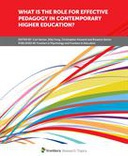Explore

What Is the Role for Effective Pedagogy In Contemporary Higher Education?
0 Ungluers have
Faved this Work
Login to Fave
The number of students entering into Higher Education (HE) continues to grow and as such the sector now stands at the threshold of a major shift in its philosophy. No longer does the academic prerogative belong to a generation who valued learning for the sake of enlightenment. Many contemporary undergraduate students enter their programmes of study with a primary desire to improve their position on the subsequent employability market. Universities have been quick to meet this need and institutional offerings have followed suit, enabling students to gain experience in a range of additional and subsidiary programmes that focus on the provision of 'value added' benefits. Here, students are encouraged to develop expertise in a range of topics from entrepreneurship and enterprise to intellectual property and even leadership skills. The first round of casualties that fall victim to such a shift are those programmes of study embedded within the humanities. As is evidenced by the falling numbers of enrolling students, the incoming cohort is less likely now to engage with such programmes, while participation in programmes that have a clear employability component has never been so high. To ensure that the HE sector continues to enable graduates to become effective citizens who contribute to the betterment of society a range of general questions need to be addressed. What does it mean to be an ‘authentic' university in the modern era? What are the real student expectations of HE and how are education providers framing and meeting these expectations? Is a new breed of academic leadership needed that will both meet the expectations of the students and guide the aspirations of academic staff? Finally, do we need an opportunity to reflect on the effective design and delivery of curriculum? Should the undergraduate student body play more of a role in the design of the curriculum or should the undergraduate student body play more of a role in the design of the curriculum or should they remain the recipients of a programme that has been designed by subject specialists? The scope of this book is wide but it brings the design and delivery of higher education programmes under the empirical gaze of educational psychology. That is to say, all chapters centre on the impact of higher educational programmes on the student-teacher relationship, student learning, achievement and identity. It is therefore crucial to explore the psychological impact of higher education institutions and how these can then be used to inform innovative educational practice and policy.
This book is included in DOAB.
Why read this book? Have your say.
You must be logged in to comment.
Rights Information
Are you the author or publisher of this work? If so, you can claim it as yours by registering as an Unglue.it rights holder.Downloads
This work has been downloaded 571 times via unglue.it ebook links.
- 172 - mobi (CC BY) at Unglue.it.
- 224 - epub (CC BY) at Unglue.it.
- 175 - pdf (CC BY) at Unglue.it.
Keywords
- Consumer satisfaction
- higher education institutions
- market access
- Policy Making
- Psychology
- Society & Social Sciences
- student satisfaction
- thema EDItEUR::J Society and Social Sciences::JM Psychology
Links
DOI: 10.3389/978-2-88945-589-8Editions

